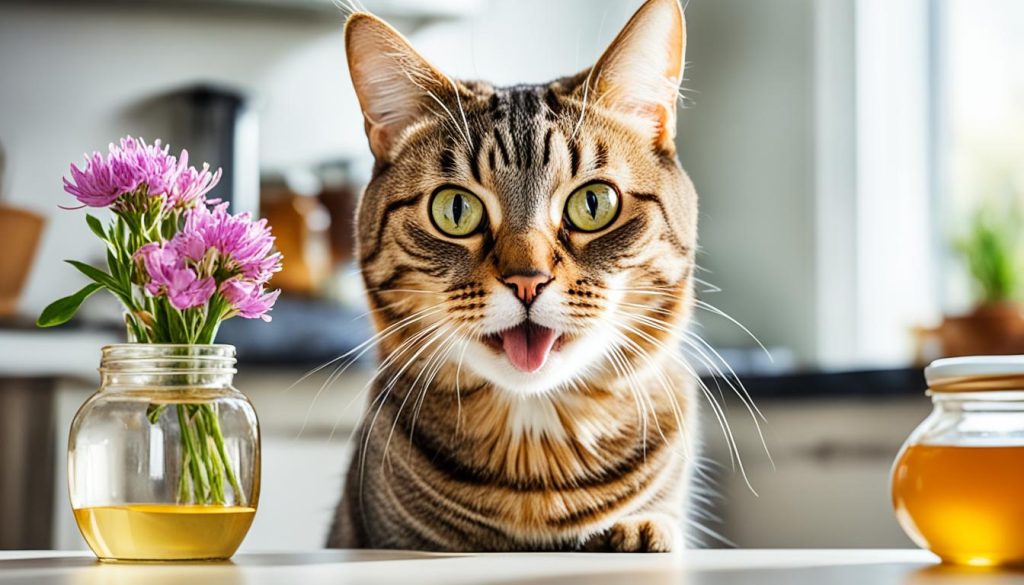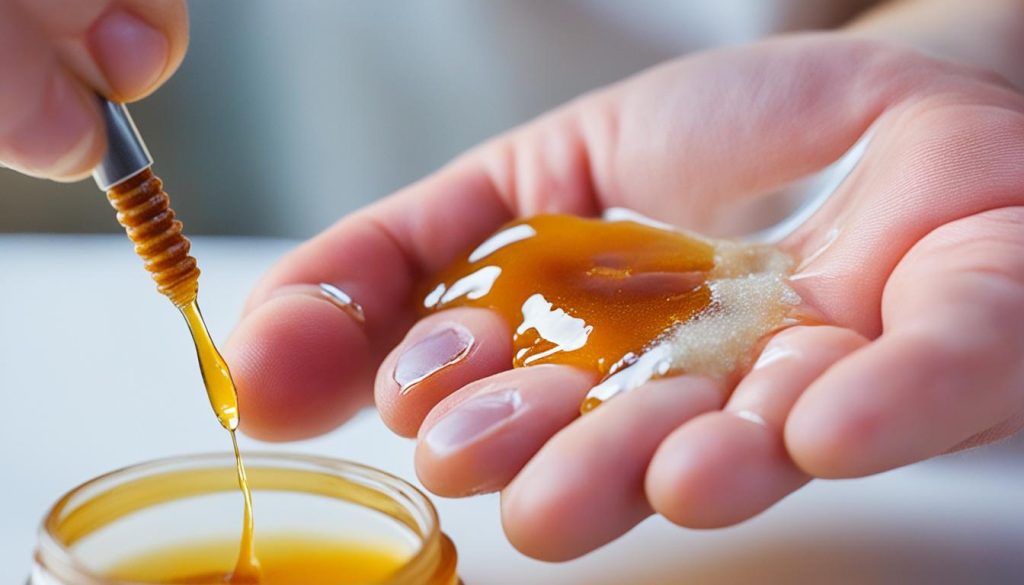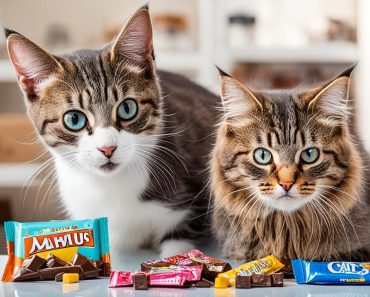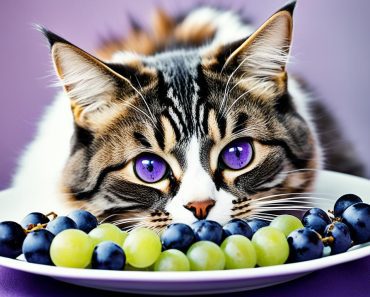Hello, cat lovers! If you’re wondering whether cats can eat honey, you’ve come to the right place. As a cat owner, I understand the importance of providing our furry friends with a balanced and safe diet. In this article, we will explore the topic of cats and honey to help you make informed decisions about what to feed your feline companion.
Can Cats Eat Honey? Yes, but it is not recommended.
- While honey is not toxic to cats, it should be given in minimal quantities.
- Cats have difficulty digesting fructose and glucose found in honey.
- Honey lacks essential nutrients that cats need in their diet.
- Consult a veterinarian before introducing honey into your cat’s diet.
- Honey can be beneficial for specific health conditions, but should be used under veterinary guidance.
Can Cats Digest Honey? Understanding the Feline Digestive System
Cats have a different digestive system compared to humans. They rely more on protein from meat and require smaller amounts of fiber.
Honey, a sweet and tempting treat for us, may not be as easily digested by our feline friends. Cats have difficulty digesting fructose and glucose found in honey, which can pose challenges for their assimilation process. While honey is not toxic to cats like almonds are, it lacks essential nutrients that cats need in their diet, such as proteins, fibers, and vitamins.
As obligate carnivores, cats require a diet that is primarily based on high-quality protein sources like meat, poultry, and fish. While honey is not harmful to cats when given in small quantities, it does not provide them with the necessary nutrition and should not be a regular part of their diet.

Is Honey Good for Sick Cats? When Can Honey Be Given to Cats with Health Conditions
Honey can be beneficial for sick cats in certain conditions, offering natural remedies for various health issues. Here are some situations where honey can be beneficial:
- Sore Throat: Honey’s soothing properties can help alleviate sore throat symptoms in cats. It can provide relief and soothe the inflammation in their throat, making it easier for them to eat and drink.
- Allergies: Honey has been found to have some antihistamine properties, which can help alleviate common allergies in cats. Giving them small amounts of honey may provide some relief from allergy symptoms such as itching and inflammation.
- Anorexia: Although not recommended by veterinarians, honey can sometimes be used as a natural remedy for cats with anorexia or loss of appetite. Its sweet taste may stimulate their appetite and encourage them to eat.
- Weight Gain: Honey can occasionally be given to underweight cats to help them gain some weight. Its high sugar content can provide extra energy and calories, aiding in weight gain. However, it should be avoided for overweight cats.
- Wound Treatment: Honey has been used for wound treatment in cats due to its antibacterial and antimicrobial properties. It can help prevent infections and promote healing. Consulting a vet before using honey as a wound treatment is essential to ensure the best course of action.
While honey can offer some benefits for sick cats, it’s important to remember that it should be used under the guidance of a veterinarian. They can provide personalized advice and recommendations based on your cat’s specific health condition. Additionally, it’s crucial to consider the potential risks and side effects associated with honey consumption in cats.

Is Honey Bad for Cats? Potential Risks and Side Effects of Honey Consumption
While honey is generally safe for cats, it is important to be cautious about how it is given to them. Giving honey in large amounts or on a regular basis can have detrimental effects on cats’ health. It is crucial to consider the following risks and potential side effects of honey consumption in cats:
- Honey and Diabetes in Cats: Cats with diabetes should avoid honey as it can raise their blood sugar levels. The fructose and glucose present in honey can have an adverse impact on cats’ glucose regulation, making it unsuitable for diabetic cats.
- Honey and Diarrhea in Cats: Excessive consumption of honey can lead to digestive issues in cats, including diarrhea. Cats have a delicate digestive system, and giving them an excessive amount of honey can upset their stomach and cause loose stools.
- Honey and Botulinum in Cats: While there is no scientific evidence to prove that honey causes botulism in cats, some reported cases have raised concerns. Botulism is a serious condition caused by the toxin produced by the bacterium Clostridium botulinum. To mitigate any potential risks, it is best to avoid giving honey to cats.
Considering these risks, it is crucial to exercise caution when giving honey to cats. While small amounts of honey can be safe for cats in some situations, it is best to consult with a veterinarian to determine if it is appropriate for your cat’s individual needs. Moderation is key when it comes to introducing honey into your cat’s diet, and it should never be a regular part of their nutrition.
Be aware of the potential risks and side effects associated with honey consumption in cats, and always prioritize their overall well-being and health. Consulting with a veterinarian is always recommended to ensure the safety and appropriate use of honey for your feline companion.
Nutritional Benefits of Honey for Cats
Honey has long been recognized for its exceptional nutritional value and healing properties, making it a potential addition to your feline friend’s diet. While it may surprise you, honey can offer certain nutritional benefits to cats that can support their overall health and wellbeing.
One of the most notable benefits of honey for cats is its antioxidant properties. Antioxidants help combat free radicals in the body, which can cause oxidative stress and contribute to various health issues. The antioxidants present in honey can help reduce inflammation and support a healthy immune system in cats.
In addition to its antioxidant content, honey also contains essential vitamins and minerals that can contribute to a cat’s overall nutrition. B vitamins, magnesium, potassium, and zinc are just a few of the vital nutrients found in honey. These nutrients play crucial roles in maintaining a cat’s energy levels, nerve function, and overall metabolic health.
However, while honey can provide some nutritional benefits for cats, it is important to remember that it should not replace their primary diet. Honey lacks essential nutrients such as proteins and fibers that cats need to thrive. Instead, think of honey as a supplement or occasional treat that can be added to their regular meals.
When incorporating honey into your cat’s diet, it’s essential to exercise moderation. Too much honey can lead to weight gain, digestive issues, and potential dental problems. As with any new addition to your cat’s diet, it’s always best to consult with your veterinarian for personalized advice and guidance.
While honey can provide nutritional benefits for cats, it should be used in moderation and alongside a balanced diet. The antioxidants, vitamins, and minerals found in honey can support a cat’s overall health and wellbeing when given appropriately. Remember to prioritize your cat’s primary nutritional needs and always consult with a veterinarian before making any significant changes to their diet.
Conclusion
Cats can safely consume honey in small quantities, but it is important to exercise caution and moderation. While honey is not toxic to cats, it lacks the essential nutrients that cats need for their overall health and well-being. However, honey can have potential benefits for certain health conditions in cats, such as soothing sore throats, alleviating allergies, and promoting wound healing.
When considering giving honey to cats, it is crucial to consult with a veterinarian to determine the appropriate dosage and usage. Vets can provide valuable guidance based on the specific needs and health conditions of individual cats. This ensures that honey is used effectively and safely as part of a cat’s treatment plan, if necessary.
While honey can have positive effects on cats, it should not replace a balanced diet that is rich in high-quality proteins, fibers, and essential vitamins and minerals. Honey should be seen as an occasional treat or supplement rather than a primary source of nutrition for cats. Keeping honey consumption minimal and under the guidance of a vet will help prevent any potential risks or side effects.
Overall, while honey can be given to cats in certain situations, it is essential to prioritize a cat’s overall nutritional needs and consult with a veterinarian before incorporating honey into their diet. By doing so, cat owners can ensure the well-being and health of their beloved feline companions.






